#koreanstudyblr
yay! another lesson, let’s look at how to say the word “when”
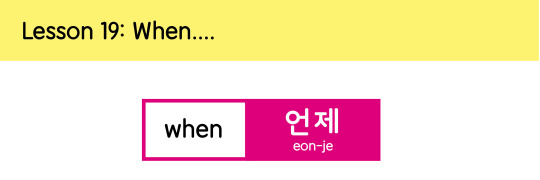
It’s simple to use, there’s no particles that need to be attached.
and the structure follows:
when + verb or
location + when + verb
Let’s have a look at some examples shall we?!
Imagine you were asking Jimin when he did his last VLive.

Imagine you were at the airport and ran into J-Hope

Or maybe this conversation between Namjoon & Jimin?
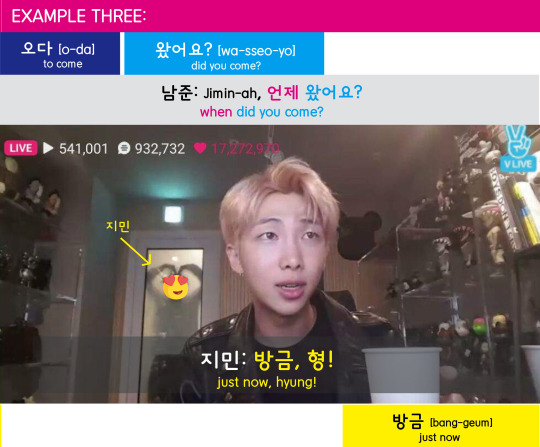
Or asking a sleepy bunny?

Or a sleepy honey bear?
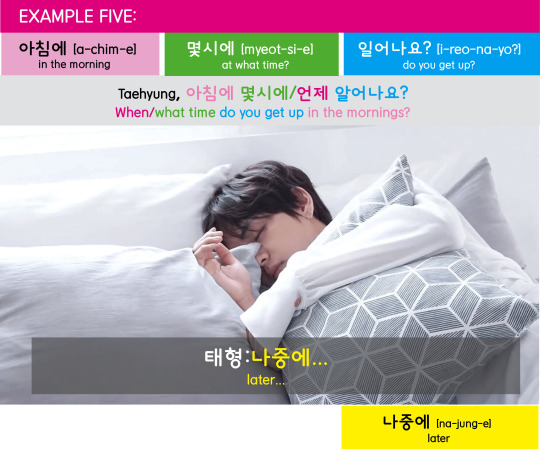
Pretty easy right?
I’m trying out a new format with vocab introduced at the beginning of the example, and then a question and answer format to contextualise the language better!
Also here are some useful nouns to do with time/times of day
(if you can’t count in Korean or say the time yet like me….ㅋㅋㅋㅋㅋㅋㅋ)
오늘 [o-neul] = today
어제 [eo-je] = yesterday
내일 [nae-il] = tomorrow
지금 [ ji-geum] = now
아까 [a-kka] = earlier (today), a while ago (today)
나중에 [na-jung-e] = later
(from TTMIK)
A short lesson!
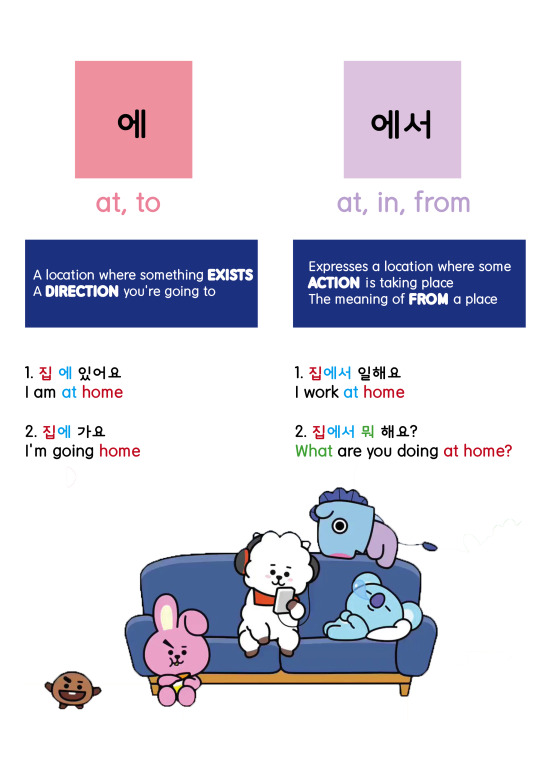
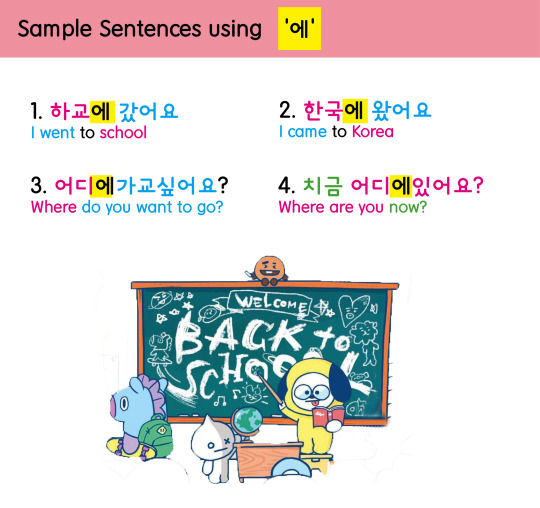

Also a list of helpful verbs from the TTMIK LESSON
오다 [o-da] = to come
왔어요 [wa-sseo-yo] = came / to have come있다 [it-da] = to be, to exist
있었어요 [i-sseo-sseo-yo] = was / to have been보다 [bo-da] = to see
봤어요 [bwa-sseo-yo] = saw / to have seen하다 [ha-da] = to do
했어요 [hae-sseo-yo] = did / to have done
As mentioned herewith my Chinese studies, I was finding it hard to naturally assimilate certain new vocab into muscle memory/everyday use. So I thought I would try an approach that would allow me to remember vocab in the long term. And be able to integrate it into my everyday life contextually. And here begins the Korean vocab iteration.
All vocab working systematically through TOPIK. This is Level 1.
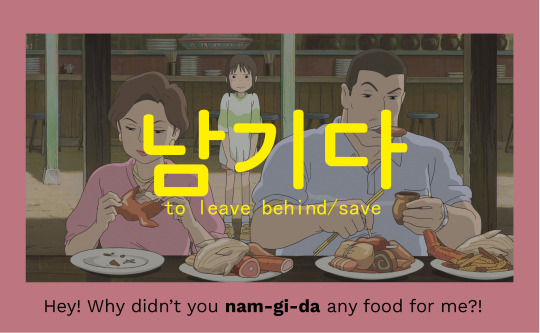
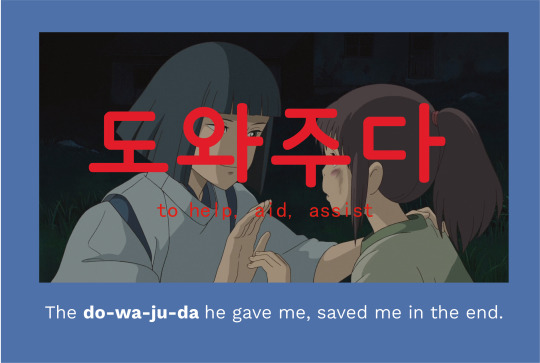
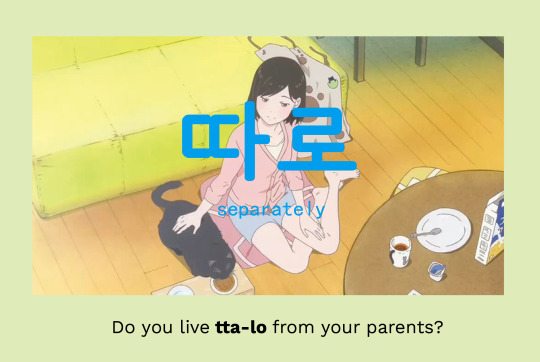


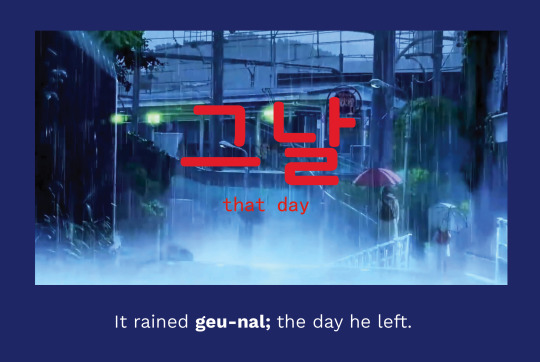
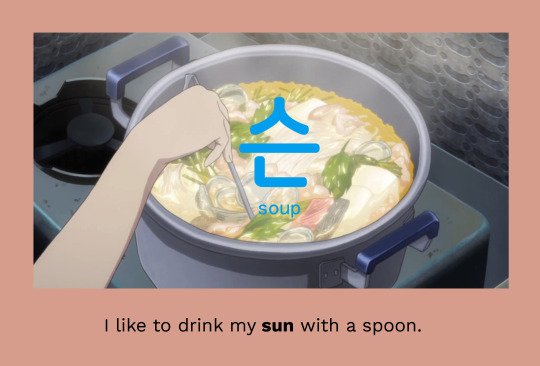
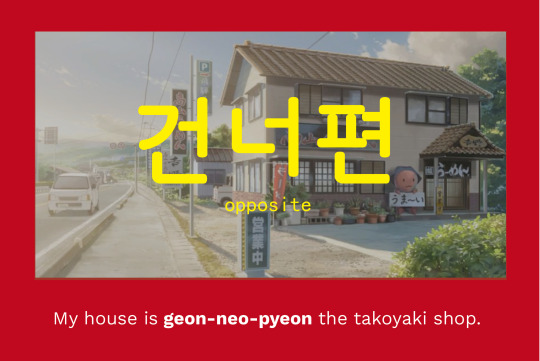
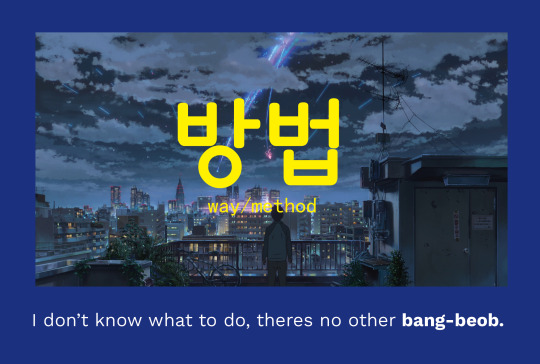



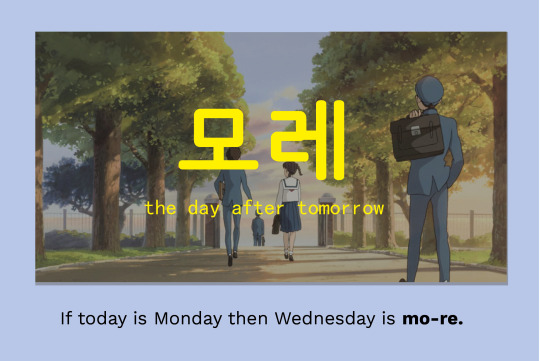
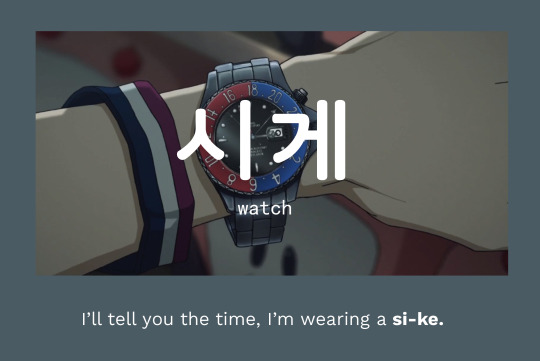
I hope these help you learn well! Something different from route learning lists of vocab. Hopefully something that sticks!
화이팅 내 친구!
BT21 어디에 있어요? [eo-di-e-iss-eo-yo?]

If you want to know the location of something, or you’ve lost something eg. All the BT21 characters. And want to know where they are, you can ask ‘where is *insert pronoun/noun*?”
In Korean the word for WHERE or WHICH PLACE is:
어디에 [eo-di]
And the location particle “TO” is:
에 [e]
Okay! Let’s try asking where different members of BT21 are, and using some location words in reply.

1. Q: Koya 어디에 있아요? [where is Koya?]
A:탁자위에있어요 [On top of the table]
2. Q: Chimmy 어디에 있아요? [where is Chimmy?]
A:탁자아래에 있어요 [Under the table]
3. Q: TATA 어디에 있아요? [where is TATA?]
A:탁자옆에 있어요 [Nextto the table]
4. Q: RJ 어디에 있아요? [where is RJ?]
A:탁자뒤에 있어요 [Behind the table]
5. Q: Cooky 어디에 있아요? [where is Cooky?]
A:탁자앞에 있어요 [In front of the table]
With the location word “where/which place” you can also make other sentences! By placing “어디에” in front of the verb you want to do.
Like:
Where do you want to go? 어디에 가고 싶어요?
or
Where do you want to eat? 어디에 먹어 싶어요?
Yay! Hope you learned well, and remembered better with some cute BT21 visuals :)
So a couple lessons back we learned how to conjugate verbs into the present tense. Well today we’re gonna have a blast from the past. And learn how to conjugate verbs into the past tense! With BTS!
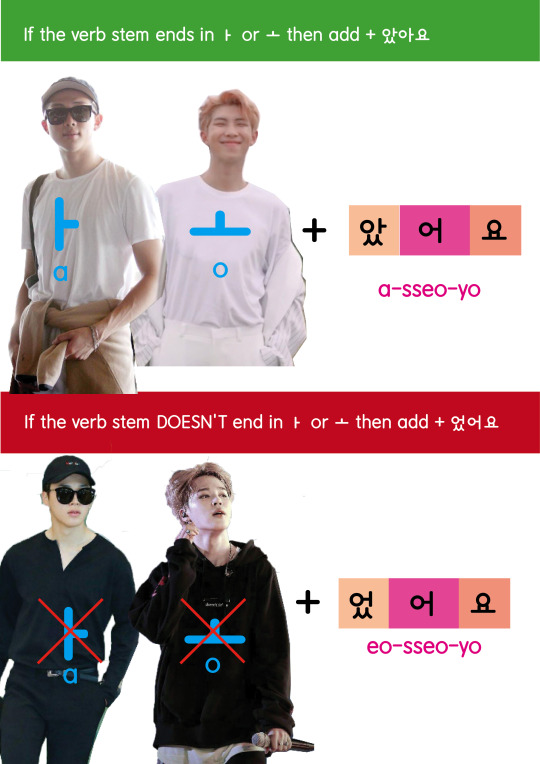
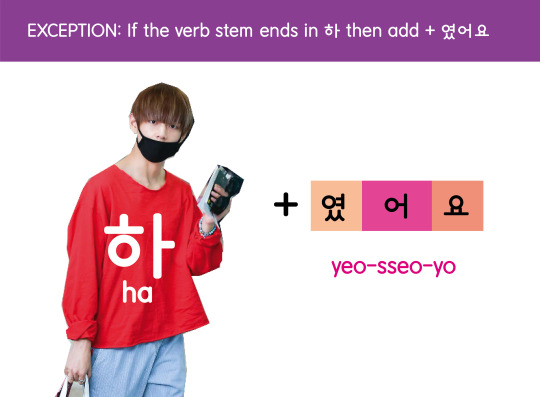
So essentially the past tense ending, is the same as the present tense conjugation. Except there’s 써 sandwiched in the middle! Let’s look at it like this:
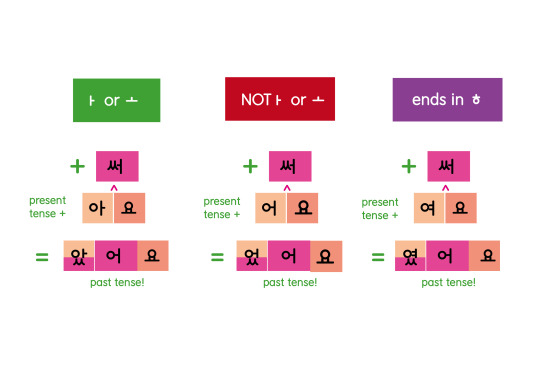
Easy hey! Okay now let’s look at some examples! :)
1. TO BUY
Remember when taehyung bought hoseok a flamingo?


Pretty straightforward, what about this one:
2. TO COME
Remember when Jimin and Jungkook came to Jin’s room to film his sugar gliders?

hehe triple J is pretty 귀여
Btw a sugar glider is: 날다람쥐의 일종 [nal-da-lam-jwi-ui il-jong]. Or “flying squirrel” in Korean

3. TO WRITE
Remember when BTS wrote down their thoughts in diary entries for summer package?

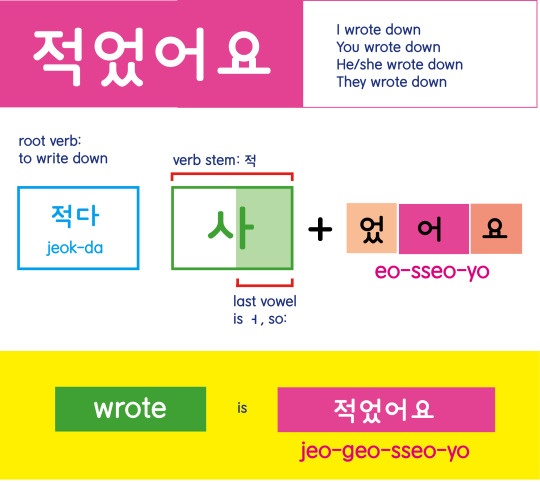
Looking at their diary entries, makes me genuinely concerned about my ability or lack thereof, to read Korean handwriting in the future…
4. TO EAT
Remember when the maknae line ate pizza in Hawaii?


5. TO CATCH
Remember when Jin ‘caught’ a fish in Malta?


6. TO USE/COMPOSE/JOT DOWN
Remember when RM composed EVERYTHINGOES, in the 3 days when he had to return from Bon Voyage 1 early?

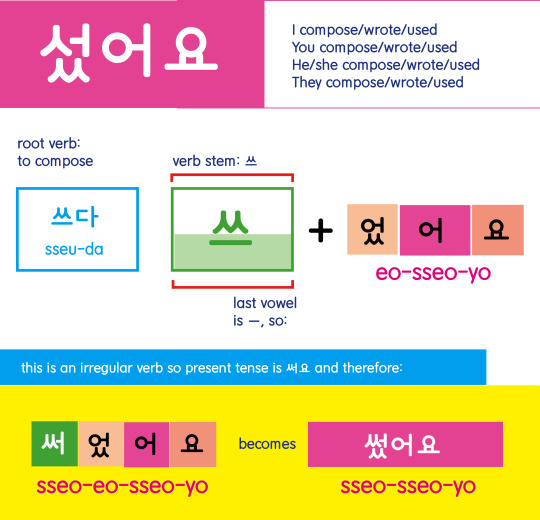
*note this is an irregular verb. So it’s verb stem changes when it’s conjugated into present tense. And likewise into past tense. And probably all the other tenses too tbh.
the end 쓰 becomes써
7. TO WAIT
Remember when Jimin waited for Jungkook to finish filming because he didn’t want him to be alone. (But JK really just wanted to finish his drawing )

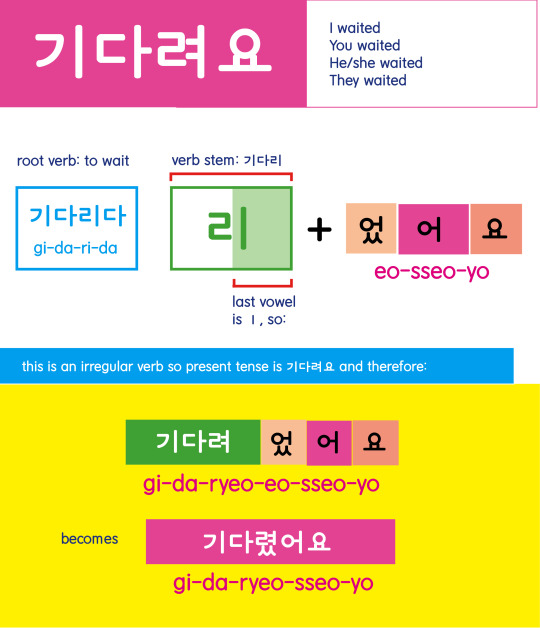
*note another irregular verb where the stem changes when conjugated.
the end리becomes려
8. TO be cool. Awesome
Remember BTS’ danger era? It was cool.


All in all pretty simple hey? Except for those darn irregular verbs. And my gosh. I wish I could remember my language studies as well as I can recall BTS moments. Alas. Maybe i’ll just ask Jin or Namjoon if I can borrow their brains…
BEGINNER SENTENCE ENDING…right? -지(요)/죠
Hello, friends! Today I will be talking about the veeery common ending you have all probably seen! Whether it be in K-Pop, in dramas, you’ve all definitely heard this and may have wondered, “hmmm.. what is the difference between 아니요 & 아니죠????” Well, today I’ll use my notes to explain it to you!
So, as expected, there are very many different usages for this ending, but for the most part, you can think of it as “…right?”
When using 존댓말(formal language), -지요 normally changes to -죠. When using반말(informal language), you use -지.
Structure ⟹
Present: verb stem +지(요)
Past: vs + 았/었/였 + 지(요)
Future: vs + (으)ㄹ 거 + 지(요)
Usages
Let’s talk about the different usages:
1) You’re talking about something supposing the other person already knows
2) Both you and the other person know about something or have a common opinion about something and you’re just mentioning it again
AS A QUESTION ENDING
3) Both you and the other person know about something and you’re just reassuring by asking (clarifying)
4) You know about something and you’re asking to confirm the fact
5) You don’t know about something and you’re asking yourself a question, usually like thinking out loud and asking other people around you at the same time
Just like there are multiple usages for the term, ‘right,’ it’s almost entirely directly translated to 지(요)
Sample Sentences
오늘 날씨가 춥지요? The weather is cold today, right?
(You know the person already knows.)
맞아요. 피자 정말 맛있죠. That’s right. Pizza is really delicious.
(You know the person agrees with you and thinks so too)
재미있지요? It’s fun, right?
(Trying to get reassurance from the other person)
이게 뭐지…? What is this…?
(Asking yourself)
그럴 수도 있죠. Yeah, that could be possible.
(You both know something is possible, so you show your agreement)
That’s all for today! A super simple beginner lesson for you guys, hopefully, it was well put. If there’s anything you don’t understand, feel free to ask me. I will always answer in 24 hours or less
화이팅, 여러분!!! 나중에 봐요~~
COURTESY OF “TALK TO ME IN KOREAN”. COME STUDY WITH ME! I PUT MY OWN NOTES FROM MY JOURNAL HERE SO YOU CAN STUDY WITH ME ANYTIME. THAT BEING SAID, THESE ARE THE NOTES I WROTE IN MY OWN NOTEBOOK SO THEY MAY NOT BE PERFECT. IF ANYONE ELSE WISHES TO USE THESE NOTES YOU MAY DO SO, AS THEY’RE JUST FROM A TTMIK LESSON. THANK YOU.


안녕 guys~! This is a new thing I’m going to try out called Learn with K-POP! This is the second part of the first song that I’ve decided to break down for you guys. Requested by user @studymila… Let’s take out that pen and paper and begin studying! Enjoy and study well :)
(I worked extremely hard on this so I would really appreciate it if you guys could reblog this and spread it around everywhere! Let’s get 150+ reblogs~~)
VERSE 2
외로움의 정원에 핀 너를 닮은 꽃 - flowers resembling you in the garden of loneliness
❀ 외로움 ❮NOUN - loneliness❯. 의 = possessive. used basically like ‘s in English. A literal translation would then be ‘loneliness’s garden’
✿ 정원 ❮garden❯. -에 location particle
❀ 핀 - 피다 ❮to bloom❯
✿ 너를 닮은 꽃 ❮flower resembling you❯. 너를 (see subject marker lesson VERY IMPORTANT linked HERE). 닮다 ❮to resemble, to look like❯. 꽃 ❮flower❯. 닮은 꽃.. to understand, please visit my lesson on nominalisation linked HERE ^^. EXTREMELY IMPORTANT… I will link it a couple times throughout this lesson so you don’t forget)
주고 싶었지 - I wanted to give to you
❀ 주다 ❮to give❯ + -고 싶다 ❮to want❯ = 주고 싶다 ❮to want to give❯… 주고 싶었다 PAST TENSE - wanted to give…
✿ -지 at the end of this sentence indicates a feeling that the speaker is trying to convince the other person of something or to convey the feeling to the other person… LESSON WILL BE LINKED AS SOON AS POSTED!!!
바보 같은 가면을 벗고서 - with my foolish mask off
❀ 바보 ❮fool❯. 같다 ❮to be like❯. 바보 같다 ❮to be like a fool❯.
✿ 가면 ❮mask❯ 벗다 ❮to take off❯
But I know
영원히 그럴 수는 없는 걸 - That I can’t do it ever (for forever)
❀ 영원히 ❮forever❯
✿ -(으)ㄹ 수 없다 ❮can’t❯ —– 그럴 수 없다 ❮I can’t do it/I have no ability to do it❯ LESSON WILL BE LINKED AS SOON AS POSTED!!!
숨어야만 하는 걸 - That I have to only hide
❀ 숨다 ❮to hide (yourself)❯ (NOT to hide something)…
✿ -만 ❮only❯
❀ (person) 숨어야 해 ❮Person has/have to hide❯…
✿ the grammar point -아/어/여야 하다 indicates an obligation to do something. LESSON WILL BE LINKED AS SOON AS POSTED!!!
추한 나니까 - Because of ugly me (because I’m ugly)
❀ 추한 나 - ugly me. See the lesson on NOMINALISATION!!!
✿ 추하다 ❮to be ugly/hideous/unsightly.❯ 나 ❮me❯
❀ -(으)니까 ❮in this case holds the meaning of ‘because’❯ LESSON WILL BE LINKED AS SOON AS POSTED!!!
CHORUS 2
난 두려운 걸 - I’m afraid
❀ 두렵다 - ❮to be afraid (of), to be frightened (of)/to be fearful (of)❯
초라해 - I’m run-down
❀ 초라하다 ❮to be shabby/run-down❯
I’m so afraid
결국엔 너도 날 또 떠나버릴까 - Will you also eventually leave me again…
❀ 결국엔 = 결국에는… 결국 ❮eventually, finally, ultimately, in the long run❯
✿ 너도 ❮you too❯ (-도 = also, too)… 날 = 나를…
❀ 또 ❮again❯ (you might know of ‘다시’ to be again, but 또 has a stronger feeling than 다시… 다시 is much more neutral as in ‘I went to the store again today’ but with 또 you can say ‘AGAIN???’… as you can see, it has much more ~feeling~ behind it
✿ 떠나다 ❮to leave❯ 떠나버리다 ❮to end up leaving❯ … To understand the grammar behind -버리다, please make sure to check that lesson right HERE!!
❀ -(으)ㄹ 까, in this case, does not serve the meaning of “should” but is rather a ‘wondering’ feelings, as in ‘I wonder if…’ LESSON WILL BE LINKED AS SOON AS POSTED!!!
또 가면을 쓰고 널 만나러 가 - I’m going to wear a mask and go see/meet you
❀ 가면을 쓰다 ❮to wear a mask❯
✿ 또 ❮again❯… 널 = 너를
❀ 만나다 ❮to meet❯, 만나러 가다 ❮to go (to) meet❯, VS+러 가다 = to go to VERB
할 수 있는 건 - The thing I can do
❀ 할 수 있다 ❮to be able to do❯
정원에 - In the garden
❀정원 ❮garden❯
이 세상에 - In this world
❀ 이 ❮this❯ 세상 ❮world❯
예쁜 너를 닮은 꽃을 피운 다음 - After blooming the flower that looks like pretty you
❀ 예쁜(거) see Nominalisation… 예쁘다 ❮to be pretty❯
✿ -ㄴ 다음(에) ❮after doing (blank)❯ LESSON WILL BE LINKED AS SOON AS POSTED!!!
니가 아는 나로 숨 쉬는 것 - Breathing as the me that you know
❀니가 아는 나 ❮the me that you know❯… 아는 = 알다 however you omit the ㄹ when you nominalise so you are left with 아는(거)… see Nominalisation
✿ 숨을 쉬다 ❮to breathe❯… AGAIN I can not stress how important Nominalisation is just to understand this sentence, they use it twice… you can see how important it is in the Korean language…
But I still want you
I still want you
CHORUS 3
어쩌면 그때 - maybe then
❀ 어쩌면 ❮maybe❯
✿ 그때 ❮then, at that time❯
조금만 - only a little
❀ 조금 ❮a little, some❯
✿ -만 ❮only❯
이만큼만 - only this much
❀ 이만큼 ❮this much❯ SEE LESSON ON -만큼 HERE
✿ -만 ❮only❯
용길 내서 너의 앞에 섰더라면 - If I got the courage to stand before you
❀ 용길 ❮courage❯ 용길 내다 (to get courage)
✿ 너의 앞 ❮in front of you (your front)❯
❀ 서다 ❮to stand❯
✿ -면 ❮if❯
지금 모든 건 달라졌을까 - Would everything be different now…
❀ 지금 ❮now❯
✿ 모든거 ❮everything❯
❀ 달라 ⇒ 다르다 ❮to be different❯
✿ 달라지다 ❮to become different❯
❀ -을까 -(으)ㄹ 까, in this case, does not serve the meaning of “should” but is rather a ‘wondering’ feelings, as in ‘I wonder if…’ LESSON WILL BE LINKED AS SOON AS POSTED!!!
난 울고 있어 - I am crying
❀ 난 = 나는
✿ 울다 ❮to cry❯… 울고 있다 = I am (currently, at this moment) crying.
❀ -고 있다 this grammar point essentially speaks about the current moment. LESSON WILL BE LINKED AS SOON AS POSTED!!!
사라진 - Disappeared
❀ 사라지다 ❮to disappear❯
무너진 - Collapsed
❀ 무너지다 ❮to collapse❯
홀로 남겨진 모래성에서 - In the left alone sandcastle
(all of those go together so basically in the disappeared, collapsed, and left alone sandcastle)
❀ 홀로 ❮to alone❯
✿ 홀로 남겨지다 ❮to be left alone❯
❀ 모래성❮sandcastle❯ -에서 location particle
부서진 가면을 바라보면서 - While looking at the broken mask
❀ 부서지다 ❮to get broken❯
✿ 가면 ❮mask❯
❀ 바라보다 ❮to stare at/look at ❯
✿ -면서 ❮while❯
And I still want you…
Guysssss that’s it for my first LEARN WITH K-POP!!! I really hope you enjoyed and I hope you enjoy this series… Make sure to message me with your suggestions of K-Pop songs you would like me to break-down and I will be happy to do that for you!!! I really hope you liked this and make sure to reblog and do everything you can to support me since I spend a loooot of time and effort doing this stuff <3 thanks so much cuties!
Don’t give up on your studies - message me if it gets too difficult and I will try to help you and motivate you!!! ♡

Hey friends! I’ve decided to help you guys learn with K-Pop and the first song I’ve decided to break down for you guys is The Truth Untold by BTS, kindly requested by user @studymila… hope y’all enjoy!
VERSE 1
외로움이 가득히 - full of loneliness
❀외롭다 (to be lonely) 외로움 (loneliness)
✿가득하다 (to be full of) 가득히 (full to the brim)
피어있는 이 garden - this blooming garden
❀피어있다 (to be in bloom) VERY IMPORTANT GRAMMAR POINT! Linked at the end as ‘Nominalisation’
가시투성이 - prickly (with thorns)
이 모래성에 난 날 매었어 - I tied myself to this sandcastle
❀모래성 (sandcastle) 매었어 = 매다 (to tie up)✿난 = 나는, 날 = 나를
너의 이름은 뭔지 - what’s your name?
❀너의 (you + possessive 의 = your), 이름 (name)✿뭔지 sort of shows an “I don’t know what your name is” feeling… this is technically a grammar point but it is quite advanced, so I won’t explain it until it is requested…
갈 곳이 있긴 한지 -maybe there’s a place to go
✿곳 (place) 갈 = future tense - taken from 갈 거예요) therefore 갈 곳 means a place to go (in the future)Oh could you tell me -
❀ as I was talking about, he doesn’t know those 2 things, (the name or whether there’s a place to go). We understand this from the -ㄴ 지 grammar point.이 정원에 숨어든 널 봤어 - I saw you hiding in the garden
❀정원 (garden) -에 (location particle)
✿숨다 - to hide (yourself) 숨기다 - to hide something else from someone. although there is a very subtle difference between the meanings and spellings of these words, it is quite important that you don’t mix them up as they still have different meanings.
❀널 = 너를. I SEE 보다 = (past tense) I SAW 봤어.
And I know
너의 온긴 모두 다 진짜란 걸 - All your warmth is real
❀온긴 (warmth) 모두 다 (all, absolutely all 100%) 진짜 - real✿the 란 걸 grammar is a little bit too advanced in my opinion, but I may end up posting about it later on so look out for that :) If you are very interested in learning about this, TTMIK has a lesson on it.
푸른 꽃을 꺾는 손 잡고 싶지만 - I want to hold the hand that picks blue flowers, but…
❀푸르다 - 파랗다 - blue✿꽃 (flower) 꽃을 꺾다 (to pick flowers)
❀꽃을 꺾는 손 - the hand that picks flowers - CHECK NOMINALISATION GRAMMAR
✿잡다 (to grab/hold) 잡고 싶다 (to want to grab/hold) VS+고 싶다 = to want to do “verb”
❀하지만 (but), it can be attached to any other verbs for example in the case of this song, 잡고 싶지만… I want to hold, but…
CHORUS
내 운명인 걸 - It’s my destiny
❀운명 (destiny)
Don’t smile on me, light on me
너에게 다가설 수 없으니까 - because I can’t get close to you
❀ -에게 = to… 너에게 = to you✿다가서다 (to get close to, approach, draw near, come close)
❀-(으)ㄹ 수 없다 —– I WILL MAKE SURE TO WRITE A GRAMMAR POST ABOUT THIS but it means ‘can’t’ or ‘to have no ability to’
✿-(으)니까 ——- I WILL ALSO WRITE A GRAMMAR POST ABOUT THIS LOL I’M KINDA SHOOK I HAVEN’T DONE IT YET… but in this case it essentially means ‘because’
내겐 불러줄 이름이 없어 - I don’t have a name to call you
❀불러 (부르다) - to call out (often used for activities that use ‘air’ such as singing, winded or brass instruments, or in this case calling out to someone)✿불러주다 = 부르다 + 주다, the addition of 주다 gives us the indication that this is an action given to someone or doing it for someone. In this case, it pretty much is like to call out TO YOU or FOR YOU.
❀내겐 = 나에게는
✿없어 (to not have/to not exist)
You know that I can’t
Show you me, give you me
초라한 모습 보여줄 순 없어 - I can’t show you my poor/run-down appearance
❀초라하다 (to be shabby/run-down) 모습 (appearance) 초라한 모습 (shabby appearance)
✿보여주다 (to show someone something)
또 가면을 쓰고 널 만나러 가 - I’m going to wear a mask and go see/meet you
❀ 가면을 쓰다 (to wear a mask)✿또 (again) 널 = 너를
❀만나다 (to meet), 만나러 가다 (to go (to) meet), VS+러 가다 = to go to VERB
THAT’S ALL FOLKS!!
For part 1, that is ;) Please let me know if you have any questions or if you have any corrections to make. I know my translations are not 100% perfect, but remember that Korean is not always 100% translateable haha.. alright hope you all have an amazing day!! I will post Part 2 in the next few days, so look out for that :)
감사합니다!!
MARKERS!!! - very important to help you understand the beginner concept of markers in the korean language.. things such as 은/는, 을/를, & 이/가..
NOMINALISATION!!! - this was mentioned throughout the post multiple times and that’s because it is SO!!! IMPORTANT!!! make sure to look through this post if you can’t understand
Hey there friends~~ Since I’m not a very avid listener of k-pop, please tell me some k-pop songs you would like to learn. I will help you learn vocabulary and grammar structures of these songs so you can sing along.
As well as recommendations, please don’t be afraid to ask questions!!!!
Hello, everyone! Today I’ll be teaching you a very common phrasing in conversational Korean. This includes poems, dramas, and songs - so I’m sure you have encountered this somewhere if you’re into Korean media. Let’s get into it!!
When you want to describe how something is done - in the same way as another action or remains in the same state as it is. (i.e. “Leave it as it is,” “Did you do as I told you?,” “I wrote down as I heard”
Construction:
Past tense: -(으)ㄴ 대로
Present tense: -(느)ㄴ 대로
Examples
보다 - 본 대로 (the way/as you saw it) 보는 대로 (the way/as you see it)
하다 - 한 대로 (the way/as you did it) 하는 대로 (the way/as you do it)
아는 대로just the way one knows
- 아는 대로 말해 주세요. Please tell me everything you know (just the way you know it)
- 아는 대로 쓰세요. Write what you know. (without changing anything)
말한 대로 just the way one said
- 제가 말한 대로 했어요? Did you do it as I said/the way I told you?
- 효진 씨가 말한 대로 했는데, 안 됐어요. I did as Hyojin said, but it didn’t work.
뜰은 대로 just like I heard
- 들은 대로 이야기해 주세요. Tell me exactly as you heard it.
- 들은 대로 잘 전달했어요. I delivered the message well. I passed on what I heard accordingly.
OTHER USAGES AND FORMS
- meaning ‘as soon as’ after a verb stem. → 도착하는 대로 전화해 주세요 (call me as you arrive)
- (v.s.+(던) 대로) to talk about a past action that was repeated or wasn’t finished → 평소에 하던 대로 하세요. (do it in the way you’ve always done it)
- 이대로, 저대로, 그대로 →이대로(just the way it is now), 저대로 (just the way that (that over there) is now, 그대로 (just the way it is in general)
- Noun + 대로(following [noun], as the [noun] goes) → 제 말대로 just like I said, 예언대로 just as the prophecy said, 마음대로 just as your heart says
- VERY POPULAR PHRASE → 마음대로 하세요 Do as you please. (could be sarcastic or genuine; the same meaning as English, but the literal meaning is like ‘do just as your heart says/desires’
This concept is a little bit difficult to get the grasp of, I’ll admit, but once you do, you can use it all the time! You can have much more natural conversations with natives and be able to recognise it in your favourite k-pop songs and say, “oh! I learned that from Taya’s Korean Study Blog!! Amazing” haha :)
I hope you all learned a lot and don’t be afraid of asking any pressing questions, I will reply as soon as possible!!
DISCLAIMER: This lesson was taken from TTMIK chapter 7 or 8 (I can’t remember). It is simply notes from my notebook and I am in no way claiming this lesson (wording and all) as my own. It is just a more condensed version and hopefully easier to understand version of the original. Thank you for understanding.
This grammar structure expresses the completion of a specific action. In addition to the fact that an action is completed, it includes the feeling of the speaker. There are two main feelings this structure is associated with…
1) Happy & Relieved (getting rid of a burden)
다 끝내 버렸어요! I’ve finished everything!
고민하다가, 사 버렸어요! I was hesitating, but I’ve (finally) bought it!
2) Sad (something happened in a different way than expected)
잃어 버렸어요… I’ve lost it…
떨어져 버렸어요… It dropped…
Sample Sentences
어제 산 핸드폰을 잃어 버렸어요. I lost the phone I bought yesterday.
안 좋은 일은 다 잊어 버렸어요~ I forgot all the bad stuff
빨리 끝내 버리세요.~ Finish quickly!
벌써 다 말해 버렸어요. Wow, already finished talking
10분 더 기다려도 안 오면 혼자 가 버릴 거예요. If I wait for 10 minutes and you don’t come, I will end up going by myself.
어제 쓴 글이 마음에 안 들어서 다 지워 버렸어요. I didn’t like the post I wrote yesterday, so I ended up erasing it.
호진 씨한테 기다려 달라고 했는데, 그냥 가 버렸네요. I told Hojin to wait, but she just went (without me)
컴퓨터가 멈춰 버렸어요. The computer stopped (working).
시작 한 김에 오늘 다 끝내 버리는 거 어때? Why don’t we finish everything while we’re at it?
영화가 벌써 시작해 버렸어요! Omg, the movie already started!
That’s all everyone!! I hope you found this lesson useful and hope that you can use it in your everyday conversations. 솔직히 쓰기 안 어려워서 해보세요 ^^ 궁금한거 있으시면, 꼭 알려주십시오. Please let me know if you have anyquestions ASAP!! I would love to help you so don’t be afraid to ask.
DISCLAIMER: This lesson was taken from TTMIK chapter 7 or 8 (I can’t remember). It is simply notes from my notebook and I am in no way claiming this lesson (wording and all) as my own. It is just a more condensed version and hopefully easier to understand version of the original. Thank you for understanding.
Korean words in school campus

교정 (School Campus)
- 구름 (Cloud)
- 하늘 (sky)
- 학교 (School)
- 나무 (Tree)
- 트랙 (Track)
- 축구장 (Soccer field)
- 농구 골대 (Rim)
